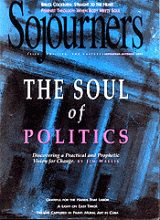As I yelled at Melissa and Gabriel for disobeying, a terrible contradiction flashed before me, but I beat it down, intent on winning this battle of wits. My children were actually playing quite happily on their own—noisy, bouncing 5 and 2 that they were—while I repeatedly ignored their articulate requests for attention.
They were "climbing the walls" because of my selfish agenda. My code of parental ethics told me to drop everything and play with them, but "I had work to do."
As I barrel toward ordination in the United Methodist Church, I typically devour books and articles on social holiness and preach right action over right belief. I lament a lack of Christian commitment to community spirituality due to the contemporary preoccupation with individualism. (Mainline Protestants often envy the rich liturgical packaging of booming evangelical churches; I admit my bias in preaching subjugation of self to matters of communal growth or survival as a "proper" priority.)
But today hypocrisy slapped me squarely in the face: While championing social holiness, I neglect the needs of my immediate family. I bemoan the resistance of disciples to place their bodies where they claim their hearts to be, yet I fail to put my heart where my body is—with family. My theological desires are painfully personal and recreational.
THE ABSURDITY of this dichotomy could only arrive at the end of a summer spent as house-husband with virtually no outside demands on my time. While my wife, Marci, was employed full time, I begrudged the things I could not do: that exegetical project left unrevised; the books unread; eccentric abandon in the library of the Graduate Theological Union; the lazy intellectual conversations I fantasized that single students enjoyed daily.
Read the Full Article
